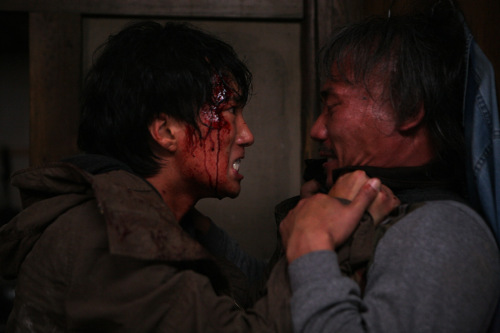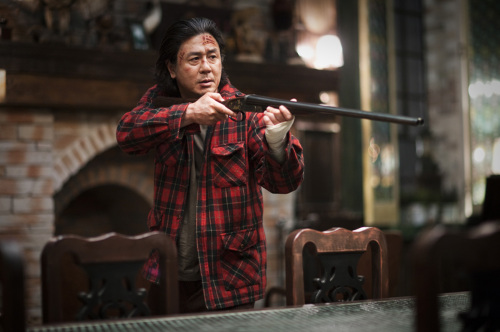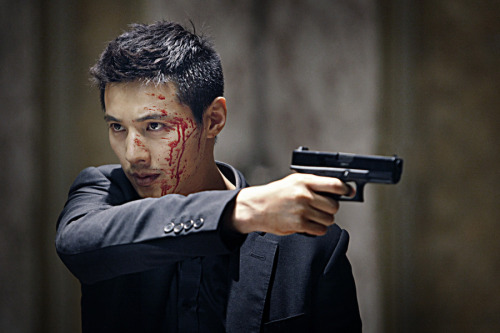Picking a Korean film to watch is like flipping a coin. Either you get something sweet and saccharine or you get something vicious and violent.
On the surface, local films can be categorized between the depiction of reality as an idealized, almost fairy tale universe through melodramas such as “The Classic” or the more violent, urban gothic version portrayed in thrillers like “Oldboy,” that revel in the embrace of the macabre.
This summer, it’s been the case of the latter with a slew of unapologetically violent pictures that have garnered much attention from the public -- two of those films are currently sitting atop the domestic box office charts.
“(Korean) movie studios are trying desperately to figure out what sells and what audiences want,” said Lee Yong-kwan, director of the Pusan International Film Festival and professor of Chung-Ang University’s department of film studies.
“They want to give the public something different, something they haven’t been exposed to and I think that is why this year we’ve seen so many violent pictures produced by big studios starring big movie stars -- it’s because we’ve seen it all before.”
As of this writing, “The Man from Nowhere,” Won Bin’s ultra-violent turn as a knife-wielding madman on a mission to clean out the criminal underworld, has topped the domestic box office with over a million ticket sales already notched during its opening week.
The film unseated yet another violent local picture, director Kang Woo-seok’s “Moss,” as the top Korean film.
This is impressive box office performance given that the Korea Media Ratings Board slapped both with a hard 19+ rating.
“Kang Woo-seok directing a picture so completely unlike his previous films reveal how desperate the local film industry is in trying to find the next big thing to get in on,” said a film producer who asked to remain anonymous.
“So far it seems to be working. Everyone seems to be talking about them.”
Writer-director Kim Ji-woon’s controversial latest, the Lee Byung-hun, Choi Min-sik tandem, “I Saw the Devil” -- set for an Aug. 12 release -- has been scoring high in the buzz meter among local audiences not to mention attracting plenty of media attention since it was recently given a limited release judgment due to its excessive screen violence.
“I Saw the Devil” is currently being trimmed for a third submission to the KMRB.
On the surface, local films can be categorized between the depiction of reality as an idealized, almost fairy tale universe through melodramas such as “The Classic” or the more violent, urban gothic version portrayed in thrillers like “Oldboy,” that revel in the embrace of the macabre.
This summer, it’s been the case of the latter with a slew of unapologetically violent pictures that have garnered much attention from the public -- two of those films are currently sitting atop the domestic box office charts.
“(Korean) movie studios are trying desperately to figure out what sells and what audiences want,” said Lee Yong-kwan, director of the Pusan International Film Festival and professor of Chung-Ang University’s department of film studies.
“They want to give the public something different, something they haven’t been exposed to and I think that is why this year we’ve seen so many violent pictures produced by big studios starring big movie stars -- it’s because we’ve seen it all before.”
As of this writing, “The Man from Nowhere,” Won Bin’s ultra-violent turn as a knife-wielding madman on a mission to clean out the criminal underworld, has topped the domestic box office with over a million ticket sales already notched during its opening week.
The film unseated yet another violent local picture, director Kang Woo-seok’s “Moss,” as the top Korean film.
This is impressive box office performance given that the Korea Media Ratings Board slapped both with a hard 19+ rating.
“Kang Woo-seok directing a picture so completely unlike his previous films reveal how desperate the local film industry is in trying to find the next big thing to get in on,” said a film producer who asked to remain anonymous.
“So far it seems to be working. Everyone seems to be talking about them.”
Writer-director Kim Ji-woon’s controversial latest, the Lee Byung-hun, Choi Min-sik tandem, “I Saw the Devil” -- set for an Aug. 12 release -- has been scoring high in the buzz meter among local audiences not to mention attracting plenty of media attention since it was recently given a limited release judgment due to its excessive screen violence.
“I Saw the Devil” is currently being trimmed for a third submission to the KMRB.

So have filmgoers just been in a mood for some violence or has there always been a polarized preference in films from the masses?

Has the recent string of heinous crimes of child rapists stirred the public enough for them to want to see on-screen revenge tales where gruesome demises are handed to murderers and rapists?
“Personally, I don’t think this recent rush toward releasing or producing violent pictures is some sort of reflection of the current social climate,” Lee said.
“It’s not as complex as that. I think it has a lot to do with movie studios wanting to latch onto something new and something different.”

Lee went on to say due to the polarization of genres in the local film industry, the ones that will suffer will be filmmakers who want to tell stories about everyday folks.
“This type of bandwagon mentality will eventually cut out the guys in the middle -- the ones making slice-of-life dramas and films that really reflect Korean society,” Lee said.
“They might be able to carve out a niche by selling them online but I don’t see much of a place for them at multiplexes.”
If one were to look for a common thread that ties all of this together, it is of course, escapism.
“To be fair, it isn’t just Koreans that go to the movies for escapist entertainment,” Lee said.
“Moviegoers from all over the world want to be entertained and want to forget about life while watching a film. But the biggest difference between our industry and theirs is that there is enough of a demand for alternative and dramatic films for those genres to survive.”
By Song kws@heraldcorp.com">Woong-ki (kws@heraldcorp.com)


![[AtoZ into Korean mind] Humor in Korea: Navigating the line between what's funny and not](http://res.heraldm.com/phpwas/restmb_idxmake.php?idx=644&simg=/content/image/2024/04/22/20240422050642_0.jpg&u=)
![[Exclusive] Korean military set to ban iPhones over 'security' concerns](http://res.heraldm.com/phpwas/restmb_idxmake.php?idx=644&simg=/content/image/2024/04/23/20240423050599_0.jpg&u=20240423183955)



![[Graphic News] 77% of young Koreans still financially dependent](http://res.heraldm.com/phpwas/restmb_idxmake.php?idx=644&simg=/content/image/2024/04/22/20240422050762_0.gif&u=)
![[Herald Interview] Why Toss invited hackers to penetrate its system](http://res.heraldm.com/phpwas/restmb_idxmake.php?idx=644&simg=/content/image/2024/04/22/20240422050569_0.jpg&u=20240422150649)





![[Exclusive] Korean military to ban iPhones over security issues](http://res.heraldm.com/phpwas/restmb_idxmake.php?idx=652&simg=/content/image/2024/04/23/20240423050599_0.jpg&u=20240423183955)



![[Today’s K-pop] Ateez confirms US tour details](http://res.heraldm.com/phpwas/restmb_idxmake.php?idx=642&simg=/content/image/2024/04/23/20240423050700_0.jpg&u=)